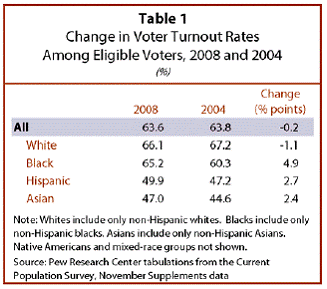By: Inoljt, http://mypolitikal.com/
In the 2008 presidential election, 65.3% of eligible blacks voted – a voting rate about equal to the 66.1% of eligible whites who voted.
This is actually quite amazing. Indeed, in demographic terms this should not be happening.
The reason why below.
Here is why. Voter participation is affected by many categories. Age, for instance, is one factor. Young people, busy with their lives and politically less involved, have historically low voting rates. The elderly, on the other hand, vote in high numbers. Immigrants are also less likely to vote – thus the immigrant-heavy Hispanic and Asian communities have quite low voting rates, as the chart above indicates.
These two specific factors affect blacks and whites about equally. Others, however, hit blacks harder. As a whole, the black electorate is much poorer than the white electorate, and poor people are less likely to vote in the United States. In the 1988 presidential election, voter turn-out amongst the bottom fifth of Americans was 36.4%. Amongst the top fifth of Americans it was 63.1%. Education levels have a positive correlation with turn-out – and education attainment is lower amongst blacks than whites. More blacks also live in the South, where turn-out has been historically lower than the national mean. Finally, there are millions of blacks disenfranchised as ex-felons.
Demographically, therefore, blacks should be voting less than whites – and yet they are not.
This has startling implications. It means that a black person is far more likely to vote than a white person of similar circumstances. Indeed, according to the Census “the odds of voting in 2008 were about twice as high for blacks,” than whites once age, region, sex, income and educational attainment were factored in.
In other words, a black plumber was twice as likely to vote as a white plumber, a black lawyer twice as likely to vote as a white one. It is only because lawyers are more likely to vote than plumbers – and because the ratio of poor plumbers to rich lawyers is higher amongst blacks than whites – that voting participation is equal amongst blacks and whites.
This phenomenon is not just limited to 2008. In 2004 black voters in the South composed 17.9% of the overall Southern electorate, equal to their share of eligible voters. Consider that Southern blacks are poorer, less educated, and more likely to be in jail than Southern whites – yet still vote at the same rates as Southern whites. This means that a 30-year-old black male making $60,000 was much more likely to vote than his white counterpart.
So the next time that a political pundit talks about low black turn-out, don’t believe it. Person to person, man to man, blacks vote more often than any other race.

As blacks fought so hard for the right to vote, it’s become a sense of duty to exercise the right to vote.
with November?
Thank you.
I have never seen a group like middle class blacks when it comes to voting. Even if they are not political people, every middle class African-American I know votes.
And while black tend to be somewhat underrepresented in elections, nearly all of the discrepancy is explained when you account for age (African Americans tend to be younger than whites, and as such a larger share of their population are simply ineligible to vote yet), income (AAs tend to be poorer than whites, slightly explained by the age thing, but largely because of checkered American history), and education (mostly the same reasons as income).
Here’s another thing to think about, the problem is more in trying to get people to get registered than it is in trying to get them to vote after registered (for people who focus on the drop-offs, think of it this way, among White voters, 93% of all registered black voters voted in the 2008 election, 89% of all registered white voters voted). I’ve always felt that the problem is less on the voting side (although I’m a strong proponent of increasing voting time (at least a week and probably more) and easier access to voting sites or mail-in balloting). I feel that registration should just come automatically upon reaching the legal voting age.
Having said all this, well done, very nuanced, something that more people really need to look at.
There are well over 5 million Americans right now who are disenfrancised because of their criminal records, and this disproportionatly hits black men (actually, men of all races, but especially blacks). In some states (suprise, suprise — mostly in the South), disenfranchisement after a felony is permanent. Others have waiting periods. Others require people to go through an application process.
This is a serious civil rights issue. While no one, I don’t think, will argue with taking the vote away from someone serving time in prison, and I think a case can be made for not voting while on probation, once one has completed their sentence, their full civil rights should be restored.
I hope I haven’t veered too far into policy discussion here, but if I have, I’ll close with this — regardless of how you feel about this, it is something hurting the Democratic Party!
this is only startling if you haven’t read Tom Schaller on the realities of the south.